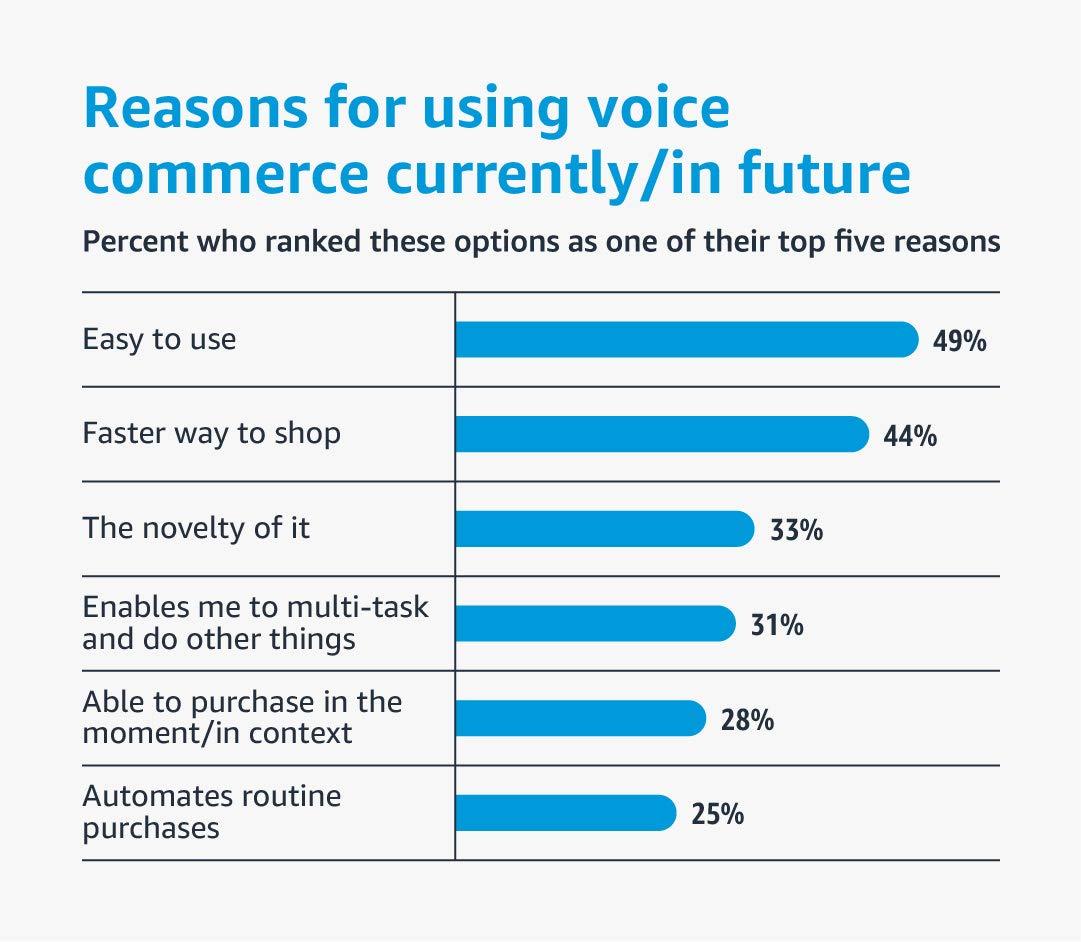What is Voice Search in eCommerce and How to Optimize Your Website for it?

Voice commerce is a technology that allows users to search and purchase products online with their voice commands. voice search ecommerce is growing with the surge in voice-powered devices, including Amazon Echo and Google Home, leading to a rise in consumers using this technology more now than before. The development in the voice-enabled devices market helps in adding momentum to the market trend. The whole world is going through Covid 19 pandemic situation, and this has changed the way we shop.
Before the pandemic, nobody ever thought about the high pace of online shopping adoption. Physical retail shopping moved to online shopping, which led to the development of voice commerce in 2021.
Retailers are focused on offering better and personalized digital shopping experiences by optimising their store for voice ecommerce and investing in upgrading their eCommerce capabilities, platforms, technology and . Voice e-commerce eases the whole experience of consumers by searching and purchasing through Voice.
This blog focuses on some crucial aspects, benefits, and advantages of Voice enabled commerce.
Why are e-Commerce store owners improving user’s online shopping journey with Voice search?
-
1. Conversation Commerce
The Voice offers more convenience that mimics the advantages of the offline shopping experience. The smart Voice Assistant helps you do things quickly and contextually.
● Voice to cart
Voice activated shopping offers the best speed for task completion. The process that includes 3-4 steps can be simplified into a single command that allows the user to include items to the cart directly or at least two steps.
● Voice Navigation
Voice Navigation allows users to search from any place while driving, sitting at home, and travelling. If you are travelling, you can search the destination just with a voice search, and you will be there without confusion.
-
2. Ease of Use
Voice assisted commerce enables more opportunities and offers the ability to use the app without interacting constantly called (hands-free shopping). In addition, it offers the ability to quickly blurt the shopping list (list creation) or collect better quality feedback by allowing users to share their experiences.
-
3. Natural Filters for Multilingual Voice Search
Search is an essential factor in any e-Commerce website or application and it is very challenging for non english speakers. Some of the reasons for drop-offs are:
- Typing keyboard challenges can be painful, especially on a small mobile keyboard.
- Transliteration challenge, when people think of an item’s name, they type them in their way. But there also SKU’s are indexed with the English version of the word. Typing can be a problem for non-English speakers.
- Typing complicated names can be a challenge.
- The auto-suggestions of products are favorable, but it limits users to some popular items and prevents showing new products.
- People sometimes might use synonyms for products, and it sometimes may lead to irrelevant search results.
- Most apps expect filters to be a straightforward UI operation, and users have to do separate disjoint activities to get search results.

Image source: Slanglabs
Voice-powered search allows users to search in their language and allows more natural searches with filters.

Image Source: Amazon Pay
How did Covid-19 help in the rise of voice search marketing?
COVID-19 has been the catalyst for consumers who have embraced the convenience of voice commerce platforms. Many people prefer online shopping compared to in-person retail. Consumers are focused on self-service features like 24/7 availability and maximized personalization. They are seeking conversational commerce.
The stay-at-home lifestyle during covid led to the rise in the number of voice-based ecommerce users. Remote shopping anytime resonated with consumers as they prefer daily routine activities like breakfast, commuting, etc., online while sitting at one place. Millennials constitute twice in number to use voice-activated technology to make purchases. Safety is one of the essential aspects that lead to embracing online shopping.
The Voice Commerce market is exploding as conversational AI solutions address multiple problems. The center of the AI process is Customer Satisfaction.
What are some of the benefits of voice ecommerce?
Voice-powered devices have different purposes, including listening to music, checking the temperature, online information search, and performing everyday activities, including ordering food and shopping online. As the voice commerce trend is a massive opportunity for voice technology, many companies have utilized the advantage of ecommerce voice search to improve the online customer experience. Let’s see the benefits voice commerce offers to the business.
-
Convenience
One of the most significant advantages of voice commerce is the ease to use. You need to activate the device with a voice assistant and your Voice. This allows consumers to shop even when they’re cooking, multitasking, or driving. In addition, online purchase of products becomes more accessible with hands-free voice commerce.
-
24/7 Availability
Consumers can use voice commerce to purchase goods and services anytime, 24/7. The feasibility of visiting a webstore anytime with voice technology makes the purchasing experience much more feasible, and you do not need to use lengthy browsing and purchasing processes.
-
Purchasing Speed
Customers need not login or fill in the personal details on a company’s web store for purchasing a product online. As a result, voice e-commerce helps in saving valuable time and maximizing ease.
-
Personalize the Buying Experiences
Voice commerce is easy to use. Therefore, people are more likely to interact more with their devices. Devices gather more data from their owners and use the collected data to personalize their customer experience. Companies that collect consumer behavior, preferences, and historical data can create powerful products and marketing strategies to beat competitors and delight the customers with every purchase.
What are some of the expected trends in voice e-commerce 2022?
Voice commerce has expanded itself to become an essential part of commerce. As a result, there are some expected voice commerce trends in 2021.
-
More Utilization of Artificial Intelligence
The digital assistant is filled with errors. The AI tech has taken steps to incorporate natural language processing (NLP) to enhance the core interaction with these assistants to overcome this problem. The companies like Amazon and Google are working harder to resolve the issues focused on an assistant misunderstanding.
Amazon has updated Alexa to respond better to inquiries and be more intelligent enough to clarify questions and remember the answers. Amazon also announced that Alexa’s functionality would be updated to change the tone in response to the conversation.
On the contrary, Google also released an update to improve the NLP of their AI. The company mentioned that it had made significant improvements in voice recognition and understanding inquiries. This is a big step forward to AI.
These advanced interactions include assistants starting conversations without prompting holograms. As a result, consumers can look forward to developing interactions with voice assistants in a short time.
-
Different Assistants for Varying Purposes
There are several instances where AI is integrated into daily lives. Along with the usual suspects on phones and homes, AI and the virtual voice assistants created with it are changing how the familiar things we interact with operate.
Some of the examples of virtual and voice assistance are the Amazon Echo Auto designed for cars and the Alexa for Hospitality used by Marriott hotels.
There are more developments in voice commerce, where voice assistants can learn consumers’ style preferences or skin tone. This allows consumers to order the right shade of foundation with just a sentence or even the preferred brand of toilet paper. The adoption of voice commerce will increase, no matter where the product is ordered.
What is the current scenario in Voice Search?
Voice search is the most commonly used technology among users. In 2021, it is predicted that 5 billion people will use voice-activated search and assistants worldwide. The number could rise to 6.4 billion in 2022. The most common tools for voice search and command are Siri, Google Assistant, and Amazon Alexa.
Additionally, 30% of voice assistant users responded they invested in Amazon Echo or Google Home to use voice-powered smart home technology, focused on controlling everything like clocks, speakers, lights, doorbells, cameras, window blinds, and other household appliances.
Voice commerce technology allows consumers to perform an internet search while asking a question or query on a smartphone, smart speaker, or personal computer. Voice shopping is a unique experience that urges products to be selected by describing words (speech), limiting the browsing scope. Relevant outcomes are recommended and prioritized (personalized suggestions) focused on the history of past purchase history or cart or user preferences.
Voice Commerce Statistics
-
43% of voice-enabled device owners use this technology for shopping.
- ● 51% of people who shop through voice, use the same to research products.
- ● 5.5 million US adults do purchase with their smart speakers on a frequency basis.
- ● 28% of people use voice search for business purposes.
- ● 52% of people use it to get info about deals, sales, and promotions from brands.
Voice search stats suggest that more than half of consumers who use smart speakers are interested in seeking more information from brands. More than 5 million Americans make direct purchases with a search assistant.
Main reasons to leverage voice based search for ecommerce store
There is a rise in voice-enabled shopping, leading to the adoption of the same in your ecommerce store. There are some reasons why you should leverage voice search marketing to your ecommerce store.
-
To Evolve the Customer Experience.
Voice commerce allows you to change and improve the method used by customers to interact with your store. It makes the process easier without the requirement to spend on the requisite workforce for customer success.
Conversational commerce is developing at a fast pace. For example, Sephora uses a virtual assistant serviceto analyze your skin and facial features and recommends some products to consumers for trial. H&M uses the KiKbot as a virtual stylist for recommending outfits is another one of the interesting voice commerce examples.
Some experts are focused on integrating voice commerce services to ease customer service. AI is being integrated into consumers’ shopping experiences. The utilization of voice search is the next step forward in the integration of AI in customer service.
-
To Rally Brand Affinity.
Consumers are most attracted to brands that use Voice as the ultimate conversation tool to ease the service. For example, AmazonFresh has strings of TikTok and YouTube videos on stores and their high-tech concept. The young consumers are more connected with the idea of the stores to make content around them. The videos by these consumers depict an evident appreciation focused on integrating Alexa into the shopping experience.
Small brands also leverage the benefit of improving brand affinity using voice search.
-
To Improve Search Engine Optimization.
voice based search an excellent method to adapt to the searching behavior of consumers and shopping habits. The emphasis on grasping featured snippets with an additional (less measurable) return can be the additional method of voice search results.
So, How to Optimize Website for Voice Search?
If your site appears in the search engine result pages (SERP), then you will be more likely to be found by the users. Some of the voice search optimisation strategies for your online store are presented below:
-
1. Include questions as the part of audio searches
You can structure your content including blog posts, FAQ pages in such a way that it can answer the queries of the target audience instead of just focusing on keywords or phrases. Focus on “long tail search queries” for voice searching and include it in the content. Use the Google Analytics tool for determining the effect of voice search on your ecommerce store and getting keyword ideas.
-
2. Focus on featured snippets
A featured snippet is the zeroth position for a Google Search that places the content higher in the search result. When Google takes a clip from a website and highlights it, in its own box for answering any queries or responding to a request, then those are called snippets.
-
3. Enlist your products on Google Shopping
Google voice search is the most widely used voice search among the users. When a customer does a Google voice search or uses Google Assistant (Google Home),your products get easily discoverable by the users. You can enlist them on Google Shopping. There are extensions available for different ecommerce platforms that can sync the online store products to Google Shopping. The extensions can map the product data, content, price, variations, etc. It is time saving and eliminates any additional resources for managing the products.
-
4. Create a good FAQ page
The FAQ Pages are getting obsolete but still many ecommerce stores use FAQ pages redundantly. The FAQ pages can save time as you can easily list down all the potential questions asked by consumers on a single page which is more easy and less energy-consuming. Try to implement FAQs with structured data.
-
5. Implement voice search in ecommerce store
If your ecommerce store has thousands of products and you want to offer a streamline experience to the users, then you need to integrate an AI-enabled voice search option in your menu or search bar that will take your consumers to the destination page.
Your customers are coming from voice search. They will expect to get their products without requiring their fingers to tap on the screen. Sometimes when you optimize the content of your site for voice search, you unconsciously do the same for the search engines. You can combine the voice search of your site to the customer service feature like voice-activated chatbot to answer your customers’ questions conveniently and easily.
Read more: Benefits of Using Chatbot in eCommerce
Voice search is mostly used by mobile phone users. The present pandemic condition urges consumers to sit at home and do shopping online. The efforts become more easy with voice commands through mobile phones as the mobile phone users are rising. It is therefore important for store keepers to make store mobile friendly and opt for voice search technology.
-
6. Register the business on Google My Business
You can provide relevant information on business to Google, like website, location, products, etc. by Google My Business. When a user searches for your business, the results appear on the top of the page in the mobile screen and voice search. Signing up to Google My Business is easy, but it requires verification. The local listing helps when users search or enter a “near me ” query.
-
7. Utilizes social media and customer service as research
For preparing your website for voice search, you have to focus on people’s questions and the expressions they’re using, and how they use the language for seeking the products your site is offering.
Conclusion
Voice search in eCommerce enables the online retailers to offer more opportunities and has the capability to change the future of shopping. Therefore, it is required for ecommerce businesses to actively look for voice search optimization to rank better and advance their digital presence. Expand your whole business culture with us using voice ecommerce. Connect with us.





